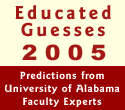 A University of Alabama accounting professor said there are at least four areas of U.S. tax code that need attention and are likely to be considered next year when tax reform takes center stage.
A University of Alabama accounting professor said there are at least four areas of U.S. tax code that need attention and are likely to be considered next year when tax reform takes center stage.
“Among the items that I think Congress will at least consider in 2005 is the alternative minimum tax,” said Dr. William Samson, accounting professor at UA’s Culverhouse College of Commerce. “That certainly needs to be modified because it is now starting to affect many taxpayers that it wasn’t intended to hit,” Samson said.
The AMT is an extra tax some people have to pay on top of the regular income tax. It was designed to prevent people with high incomes from using special tax benefits to pay little or no tax. But for various reasons the AMT reaches more people each year, including some people who don’t have very high income or many special tax benefits.
Samson said Congress may also work on the Social Security problem. “The proposals that need to be adopted are changes to the expected retirement dates for the full payout of Social Security,” Samson said. “By changing the expected retirement from 65 to a bit longer — say 67, phased in over time such that the change applies to younger workers, much of the strain on the system which is projected will be removed.” Proposals for ‘privatization’ of Social Security benefits has lost support in recent years from some because of the sputtering stock market.
“Overall, I’d say the likelihood of Congress doing something about the Social Security problem next year remains small, because reform could be painful to some citizens, and there could be a political backlash,” Samson said.
Some temporary provisions in the Internal Revenue Code should draw action, Samson said. “The estate and gift tax is completely phased out by 2010, but is set to return in 2011 in full, unless Congress acts,” Samson said. “Imagine trying to plan an estate with the off-and-on estate tax. If you die in 2010, there is no tax on your estate, but if you live a year longer, your estate in 2011 might owe almost 50 percent of your estate making Uncle Sam your biggest beneficiary.”
Lastly, Samson said, there may be action on a proposal that would impact those who do not itemize. For example, a portion of charitable contributions of non-itemizers may become deductible.
Contact
Dr. William Samson, 205/348-2903, wsamson@cba.ua.edu